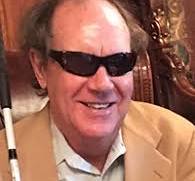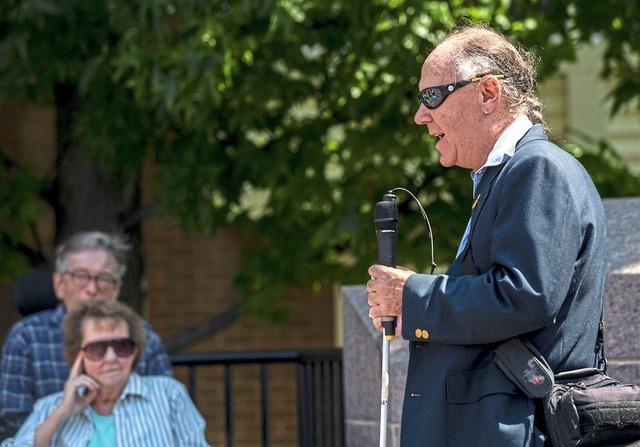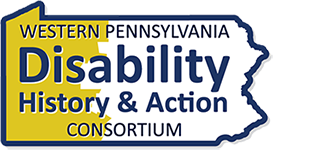
Bill Chrisner, a founding member of the Western Pennsylvania Disability History and Action Consortium who has been at the forefront of disability rights for nearly six decades, participated in an oral history interview in July 2024 with Sierra Green, senior outreach archivist at the Heinz History Center.
In the oral history, Chrisner discusses his childhood experience with progressive vison loss, his schooling, and his professional work within the Independent Living Movement. Chrisner also reflects on the role of Centers for Independent Living (CILs), particularly the Three Rivers Center for Independent Living (TRCIL), which he led for 16 years. The interview is a testimonial to Chrisner’s lifelong commitment to ensuring that people with disabilities enjoy full participation and integration in larger society.
Chrisner, born in 1953, grew up in Ligonier, PA. As a child, he was diagnosed with uveitis, a progressive eye disorder. Despite numerous medical interventions, his eyesight worsened. His parents pursued various treatments to attempt to improve his vision, to no avail.
At a time when few resources were available to students with disabilities, Chrisner attended public schools. Always a good student, his education was adapted by a variety of common-sense accommodations, volunteer “readers,” and by his mother, who read his schoolbooks to him. At the beginning of his senior year, his eyesight worsened and the school administration recommended transfer to a school for blind students. Chrisner resisted this suggestion, which led to the school hiring an itinerant support teacher. Chrisner finished his senior year at Ligonier Valley High School as class president, graduating in 1966.
Chrisner moved on to the University of Pittsburgh, where he majored in psychology and took advantage of a greater range of disability services such as orientation and mobility training provided by the Bureau of Blindness and Vision Services (formerly, the Bureau of Blind and Physically Handicapped). His positive experience at Pitt included running for student council, intramural wrestling, and membership in Sigma Chi Fraternity.
Chrisner then completed a graduate degree in rehabilitation counseling, which was funded by the Office of Vocational Rehabilitation. Upon completion of this program in 1971, he worked as a counselor at Pittsburgh’s Children’s Institute, then known as the Home for Crippled Children. He also earned a second master’s in public administration. Among his accomplishments over 16 years at The Children’s Institute was the launch of Project Star, a program to support adoption of children with disabilities.

In 1988, Chrisner was named executive director of the Three Rivers Center for Independent Living (TRCIL), the Center for Independent Living (CIL) serving the greater Pittsburgh area. As the name suggests, Centers for Independent Living assist people with disabilities to live self-directed lives. Chrisner’s 16-year tenure at TRCIL brought significant advances in funding for the organization, which enabled it to pursue a key part of its mission of transitioning disabled individuals from nursing homes and other institutions into home- and community-based services. Under Chrisner’s leadership, TRCIL stood at the forefront of advocacy for the Americans with Disabilities Act (ADA) and become involved in the law’s implementation in Southwestern PA. TRCIL was one of the plaintiffs in a lawsuit focused on the City of Pittsburgh’s provision of curb ramps on sidewalks. TRCIL was also a plaintiff in a lawsuit calling out the City’s Housing Authority for not providing accessible housing.
In 2004, Chrisner accepted a position with the Dayle McIntosh Center, a CIL in Orange County, California. By 2007, Chrisner moved back to Pennsylvania and worked as a lead advocate for Disability Rights Network before retiring and moving back to Pittsburgh in 2013.
Chrisner’s volunteer roles have included serving as chair of the Pennsylvania Rehabilitation Council and as a member of the City of Pittsburgh-Allegheny County Task Force on Disabilities.
The digital recording and transcript of Chrisner’s interview with Sierra Green can be accessed at the History Center’s Detre Library & Archives. His collection at Heinz History Center includes digital reproductions of photos from the 1966 Ligonier Valley High School yearbook.
Chrisner is a frequent speaker at disability rights events, such as the annual Disability Pride Pittsburgh. One of his key points is that the social stigma of having a disability, not the disability itself, is the most significant barrier for people.
The language surrounding disability is also critically important, he says. “The word ‘inclusion’ is a power word and not a good power word,” he says in his interview, explaining that Inclusion implies that the people in charge – not the people who need access – have the responsibility to create change. Chrisner suggests that “full participation,” a concept he has championed his whole career, is the better concept because it places the person with disability as the catalyst for change.


